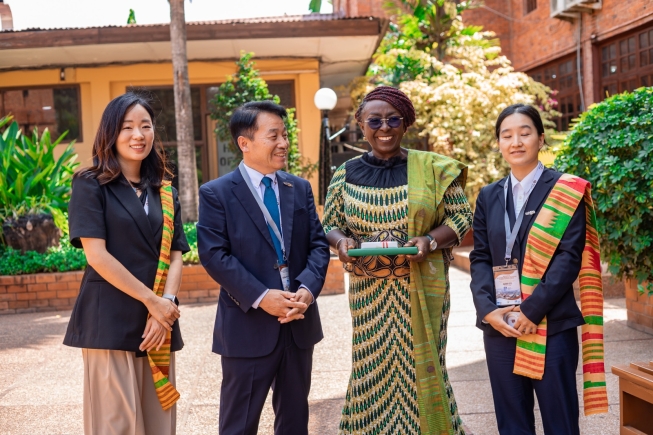![]()

“We must own our story”: Tourism Minister champions African narratives at Heritage Forum
Ghana has taken centre stage in a renewed continental push to redefine how Africa’s cultural and historical heritage is interpreted, as experts, policymakers and international partners convened in Accra for the Regional Workshop on the Interpretation of World Heritage in Africa.
Opening the week-long event on Monday, Minister for Tourism, Culture and Creative Arts, Abla Dzifa Gomashie, issued a call for Africa to take full ownership of its narratives, stressing that heritage interpretation must evolve to reflect the lived experiences, voices and identities of African communities.
“We must be in charge of our own narrative,” she told participants. “Until the lion learns to write, the story will always glorify the hunter.”
The workshop in Accra brought together site managers, cultural experts and institutional representatives from across the continent. It is being organised by the Ministry of Tourism, Culture and Creative Arts in collaboration with the Ghana Museums and Monuments Board, the African World Heritage Fund, WHIPIC, the Ghana Commission for UNESCO and UNESCO Accra, with support from the Korea Heritage Service.
Gomashie, speaking on behalf of President John Dramani Mahama, said the gathering aligns with Ghana’s commitment to championing cultural preservation and strengthening capacity across the continent. She said heritage interpretation must move beyond dates and events to connect directly with people and empower communities to tell their own stories.
The Minister also celebrated Ghana’s recent inscription of the Amphitheatre textile tradition onto the UNESCO World Heritage list, describing it as a milestone that demonstrates the need for interpretation rooted in authenticity and driven by local custodianship.
The Deputy Director-General of WHIPIC, Mr. Heung Nyeon Kim, in his remarks, praised Ghana’s warmth and hospitality, noting that his first visit to Africa had revealed a deep well of creativity and cultural richness. He pledged WHIPIC’s continued collaboration with African experts working to build more inclusive and community-driven approaches to heritage interpretation.
The Executive Director of the African World Heritage Fund, Dr. Albino Jopela, highlighted the urgent need for Africa to reshape global understanding of its heritage. Despite being home to the origins of humanity and diverse cultural landscapes, he noted that Africa has only 154 of more than 1,200 World Heritage Sites worldwide. Many of these, he said, still bear colonial-era interpretations that distort or silence African perspectives.
“Re-thinking interpretation must not be seen as secondary; it is central to why we, as Africans, should care about these sites,” Dr. Jopela said.
Officials from UNESCO and the Ghana Commission for UNESCO also emphasised the importance of the workshop in strengthening Africa’s representation within the global cultural heritage space. Participants will over the coming days engage in technical sessions aligned with UNESCO’s Culture 2030 Indicators, focusing on education, tourism, interpretation, community empowerment and sustainable site management.
The workshop is expected to conclude with a set of actionable recommendations aimed at enhancing interpretation practices, preserving authenticity and strengthening the role of heritage in shaping Africa’s collective identity and development agenda.
